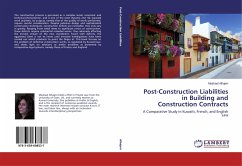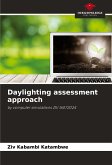The construction process is perceived as a complex social, economic and technical phenomenon, and is one of the most dynamic and risk exposed work activities. Its outputs, namely that of the quality of works performed, require careful consideration. Despite judicious design and sophisticated construction techniques, construction defects are inevitable; they only vary in gravity. Ranging from trivial items to significant errors of construction, these defects require substantial remedial works, thus adversely affecting the income stream of the new investment. Faced with defects, the aggrieved client is not to know until intrusive investigations have been carried out which producer to point the finger at. This book focuses on the problem of defective construction works, as regulated by Kuwaiti law, and sheds light on solutions to similar problems as presented by comparative legal systems, namely those of France and England.
Bitte wählen Sie Ihr Anliegen aus.
Rechnungen
Retourenschein anfordern
Bestellstatus
Storno








